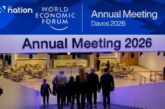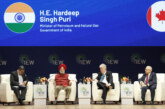By Shweta Tyagi*
A Report on High Level Multi-stakeholder Policy Dialogue to ‘End Plastic Pollution and deliver actions for Harmony with Nature
Introduction
On June 3, 2025, the India Water Foundation convened a High-Level Multi-Stakeholder Policy Dialogue with support from the National Water Mission, Ministry of Jal Shakti, was held virtually to commemorate World Environment Day and the International Day for Biodiversity. It brought together policymakers, scientists, international experts, and civil society to address the escalating crisis of plastic pollution and its impact on biodiversity. Guided by the adept moderation of Ms. Shweta Tyagi, Chief Functionary, India Water Foundation, The dialogue focused on the urgent need for systemic, coordinated, and innovative solutions to end plastic pollution and foster harmony with nature. The dialogue served as a vibrant platform for sharing knowledge, identifying gaps, and formulating a collaborative roadmap to combat plastic pollution through holistic, multi-sectoral actions.
Opening Remarks by Dr. Arvind Kumar, President, India Water Foundation, set the tone by highlighting the urgency of addressing the triple planetary crisis—climate change, pollution, and biodiversity loss. He stressed that plastic pollution now impacts every ecosystem from mountaintops to ocean trenches and noted the profound presence of microplastics in human bloodstreams, food, and water. He emphasized that addressing plastic pollution must involve understanding the full life cycle of plastics, strengthening international frameworks like the INC Global Plastics Treaty, and aligning with the Kunming-Montreal Global Biodiversity Framework. He called for robust institutional capacity, inclusive partnerships, and investment in circular economy models.
Chair Address by Shri Raj Bhushan Chaudhary, Hon’ble Minister of State, Ministry of Jal Shakti, Government of India wherein he outlined India’s multifaceted approach to tackling plastic pollution. He cited the Swachh Bharat Abhiyan as a foundational movement and detailed initiatives under the Swachh Bharat Mission–Grameen and Urban, including the establishment of over 1,790 Rural Plastic Waste Management Units and innovative models like the Kabad Mandi app for incentivizing household-level recycling. The Minister emphasized the importance of community participation, private sector partnerships, and regulatory frameworks such as the Plastic and Solid Waste Management Rules. He also highlighted the “Catch the Rain – 2025” campaign, linking plastic reduction with water conservation and climate resilience
Co-Chair address by Ms. Astrid Schomaker, Executive Secretary, CBD urged synergistic implementation of SDGs and KMGBF, calling for biodiversity mainstreaming across governance, business, and civil society.
Dr. Satya Tripathi (Global Alliance for Sustainable Planet) flagged the risks of corporate capture and delayed action within treaty negotiations. He underscored the need for Extended Producer Responsibility (EPR), innovative finance models, and real-time accountability mechanisms to transition from ambition to implementation.
Dr. Ritesh Kumar (Wetlands International) cautioned that wetlands, as crucial ecological conduits, are increasingly choked with plastics, threatening biodiversity and ecosystem services. He called for quantifying plastic impacts and mainstreaming plastic management in wetland governance.
Ms. Kerry Allbeury (UNEP INC Secretariat) updated on the INC Treaty Process, urging inclusive engagement, regional consultations, and bridging policy gaps to ensure a legally binding instrument addressing all stages of the plastic life cycle.
Ms. Sara Manuelli (FAO, Mountain Partnership) emphasized the vulnerability of mountain ecosystems, where plastic waste now threatens vital freshwater sources and ecotourism economies. She advocated zero-waste tourism, community-led models, and financial investments for local waste management.
Dr. Karine Siegwart (IUCN) stressed the absence of biodiversity considerations in INC draft texts, advocating for explicit inclusion of biodiversity clauses, rights of Indigenous Peoples, and just transitions in the treaty. She underscored the need for alignment with other multilateral environmental agreements (MEAs) such as CBD, SDGs.
Dr Gopal Kumar (IWMI) highlighted the need to integrate plastic monitoring into watershed, and river basin management plans, particularly in agricultural landscapes where plastic mulch and packaging waste are rising. He advocated for nature-based solutions and market incentives for recycling.
Dr. Bholu Ram Yadav (CSIR-NEERI) flagged operational bottlenecks such as informal waste sectors, lack of data transparency, and poor segregation. He stressed the need to prioritize upcycling over recycling, develop ICT-based systems for traceability, and incentivize biodegradable alternatives.
Major Challenges Identified:
- Persistent single-use plastic usage despite regulatory bans, due to inadequate enforcement and lack of viable alternatives.
- Fragmented waste management infrastructure, particularly in rural and peri-urban areas.
- Limited public awareness and behavioural inertia regarding plastic use and disposal.
- Insufficient circularity in the plastic value chain, with most plastics used only once before disposal.
- Complexity in recycling multi-layered and composite plastics, such as thermocol (EPS).
- Cross-sectoral coordination gaps between government, private sector, and civil society.
Key Recommendations:
A. Policy Integration and Governance
- Institutionalize Plastic-Biodiversity Linkages: Ensure the Global Plastic Treaty (INC) explicitly integrates biodiversity protection, including a standalone article or clause linking plastic action to biodiversity goals.
- Harmonize National Frameworks: Align India’s Solid and Plastic Waste Management Rules with water, biodiversity, and climate policies under a common sustainability framework.
- Strengthen EPR: Mandate traceable EPR implementation, linking formal and informal sectors via digital platforms to prevent greenwashing and ensure compliance.
B. Infrastructure and Implementation
- Decentralized Waste Management: Expand PWMUs in both rural and peri-urban zones. Foster local MRFs with public-private partnerships and invest in logistics for waste transport to recycling centers.
- Mainstream Monitoring in Wetland and Watershed Plans: Embed plastic tracking within National Wetland Inventories, water quality assessments, and river basin management strategies.
C. Finance and Innovation
- Innovative Finance Models: Mobilize outcome-based financing, credit-sharing mechanisms, and ESG-linked investment channels to fund large-scale plastic alternatives and clean-up infrastructure.
- Upcycling Technologies: Incentivize R&D on technologies that convert waste plastics into fuels or raw materials. Pilot large-scale chemical recycling and biodegradable alternatives.
D. Behavioural Change and Community Engagement
- Mission LiFE 2.0 with Circular Economy Focus: Expand Mission LiFE campaigns to specifically include plastic alternatives, circularity principles, and localized zero-waste initiatives.
- Youth and Faith-based Engagement: Leverage educational institutions, religious networks, and influencers to cultivate a culture of environmental stewardship and civic responsibility.
- Data Transparency and Public Dashboards: Develop and promote open data platforms for real-time monitoring of plastic flows, EPR credits, and municipal compliance.
Ms. Shweta Tyagi’s closing remarks captured the essence of the event: “The responsibility is not limited to one stakeholder or one government. This will only be possible when governments, companies, and citizens come together to prioritize the planet over convenience and profit.” Her emphasis on systems thinking, behavioural change, and shared accountability brought the event to a resonant conclusion.
Video Link: https://www.youtube.com/watch?v=jmqweELkSI8














